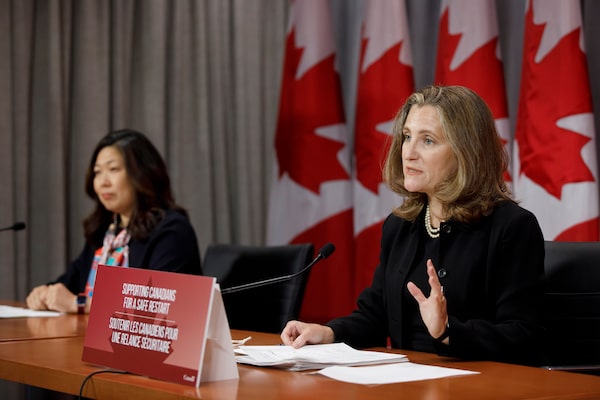
Deputy Prime Minister Chrystia Freeland speaks as Mary Ng, Minister of International Trade, Small Business and Export Promotion looks on during a new conference in Toronto on Aug. 31, 2020.Cole Burston/The Canadian Press
Gary Sands is senior vice-president of the Canadian Federation of Independent Grocers.
The smiling photo-op announcement this month by Minister of Finance Chrystia Freeland, along with Minister of Small Business Mary Ng, that credit card interchange fee rates were being reduced for small businesses was actually a betrayal by both these ministers of the commitment the federal government made in its 2021 budget.
Businesses pay an interchange fee, more appropriately called a “swipe” fee, for every sale that involves a credit card. The change in payment patterns during the pandemic had resulted in the amount of interchange fees paid by businesses in Canada, ballooning to more than an estimated $10-billion a year. In the 2021 budget, Ms. Freeland promised that she would ensure that small and medium-sized businesses “benefit from pricing that is similar to large businesses.”
But after two years of subsequent discussions and negotiations under the auspices of the Finance Department, the government has abandoned that pledge. Now, there is no mention of relief for any medium-sized businesses, while the threshold established for small businesses to receive a reduction means that only the tiniest small businesses will realize any meaningful savings from these indefensibly high fees.
Only businesses with less than $300,000 in Visa credit-card sales and less than $175,000 for Mastercard will benefit. That paltry benchmark took two years to wring out of the banks and card companies sitting on their $10-billion a year windfall? Clearly Ms. Ng and Ms. Freeland opted to support Bay Street over Main Street.
An independent grocer operates with margins of around 2 per cent. Juxtapose a margin of 2 per cent against interchange fees of 1.4 per cent and higher on all your transactions – and that slim margin becomes a tenuous business model.
In the context of public angst over rising prices, for the government to exclude small and medium-sized family-owned convenience stores, restaurants and independent grocers from passing on the savings of reduced swipe fees is perplexing, at best.
There can be no doubt that the billions siphoned out of the pockets of businesses in Canada has an impact on prices. The government has also been trumpeting its much publicized $2.5-billion of tax money for a temporary “grocery rebate.” But an equivalent reduction in interchange fees, with no tax dollars being needed, would provide more relief to consumers and on a permanent basis.
It is clear that the Ministers of Finance and Small Business buckled in the face of the payments industry’s well-funded vociferous clamouring that any reduction in swipe fees would have some amorphous effect on reward points for consumers.
The fundamental frailty of that argument is denoted by the fact that the lower swipe fees enjoyed by big business in Canada have absolutely no impact on reward points for their customers, who use the same credit cards to conduct the same transactions as they would at any small or medium-sized business. It should also go without saying that reward points should not supplant the importance of trying to offset the impact of rising food prices, particularly in many of Canada’s rural, Northern and remote communities.
Providing consequential reductions in swipe fees – at no taxpayer expense – to all of Canada’s small and medium-sized businesses, with their brick-and-mortar stores rooted in their communities, will do more for consumers than any temporary grocery rebates.
Small businesses compete on an uneven playing field in Canada. The burden of an opaque and Sisyphean payments system encumbers their ability to just stay on that field. It’s time for all businesses to pay similar interchange fees. If the government thinks the perfunctory gesture they put forward this month has ended the fight for fairness in the payments industry, they are sadly mistaken.
To borrow from Winston Churchill: “This is not the end. It is not even the beginning of the end. But it is perhaps, the end of the beginning.”